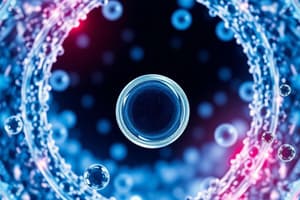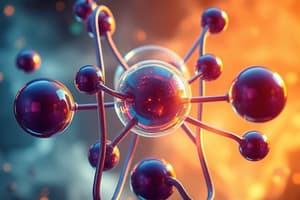Podcast
Questions and Answers
What is the fundamental definition of matter?
What is the fundamental definition of matter?
- Anything that can change state
- Anything that contains neutrons only
- Anything composed solely of liquids
- Anything that has mass and volume (correct)
Which particles make up an atom?
Which particles make up an atom?
- Ions, atoms, and molecules
- Quarks, leptons, and bosons
- Protons, electrons, and neutrons (correct)
- Photons, positrons, and neutrinos
What characterizes the plasma state of matter?
What characterizes the plasma state of matter?
- Atoms are in an excited state (correct)
- Atoms are in a low energy state
- Atoms have no mass
- Atoms are rigid and fixed
Which of the following is NOT a phase of matter?
Which of the following is NOT a phase of matter?
Which of the following correctly describes solids?
Which of the following correctly describes solids?
What is true about gases?
What is true about gases?
What charge do electrons carry?
What charge do electrons carry?
What is the function of the nucleus in an atom?
What is the function of the nucleus in an atom?
Matter is anything that has ______ and volume.
Matter is anything that has ______ and volume.
The atom is the ______ of matter.
The atom is the ______ of matter.
Atoms are composed of three types of particles: protons, neutrons, and ______.
Atoms are composed of three types of particles: protons, neutrons, and ______.
The ______ of an atom is positively charged and contains protons and neutrons.
The ______ of an atom is positively charged and contains protons and neutrons.
Solids have definite mass, volume, and ______.
Solids have definite mass, volume, and ______.
Liquids have definite mass and volume but no definite ______.
Liquids have definite mass and volume but no definite ______.
Gases have no definite mass, volume, or ______.
Gases have no definite mass, volume, or ______.
Plasma exists when the atoms are in an ______ state.
Plasma exists when the atoms are in an ______ state.
Flashcards are hidden until you start studying
Study Notes
Definition of Matter
- Matter encompasses anything with mass and volume, such as a cup, pen, or eraser.
- Defined as anything composed of atoms and molecules, consisting of protons, neutrons, and electrons.
Structure of Matter
- Atoms are the fundamental building blocks of matter, responsible for forming all substances.
- Atoms are in constant motion and combine in various ways to create diverse materials with different properties.
Atoms
- Composed of three primary particles: protons (positive charge), neutrons (neutral charge), and electrons (negative charge).
Nucleus
- The nucleus is the atom’s positively charged core.
- Contains:
- Protons with a positive charge.
- Neutrons with no charge.
Electrons
- Electrons orbit the nucleus of the atom.
- Carry a negative charge.
Phases of Matter
- Matter exists in four primary states:
- Solid: Defined mass, volume, and shape.
- Liquid: Defined mass and volume, but takes the shape of its container.
- Gas: No defined mass, volume, or shape; particles are widely spaced.
- Plasma: Exists when atoms are in an excited state; the state of matter in stars, including the sun, due to nuclear fusion.
What is Matter?
- Matter is defined as anything that possesses mass and volume, including everyday objects like cups and pens.
- Composed of atoms and molecules, matter consists of protons, neutrons, and electrons.
Structure of Matter
- Atoms serve as the fundamental building blocks of matter, forming all substances through their combinations.
- Atoms exist in constant motion, leading to a diverse range of materials with varying properties.
Atoms
- Atoms comprise three primary particles:
- Protons (positively charged)
- Neutrons (neutral charge)
- Electrons (negatively charged)
Nucleus
- The nucleus is the atom's positively charged center, containing protons and neutrons.
Electrons
- Electrons orbit around the nucleus and carry a negative charge.
Phases of Matter
- Matter is classified into four distinct phases or states:
- Solid:
- Has a definite mass, volume, and shape.
- Liquid:
- Possesses definite mass and volume but lacks a definite shape.
- Gas:
- Lacks definite mass, volume, and shape.
- Plasma:
- A state of matter where atoms are in an excited state, such as in stars like the sun, due to nuclear fusion.
- Solid:
Studying That Suits You
Use AI to generate personalized quizzes and flashcards to suit your learning preferences.




